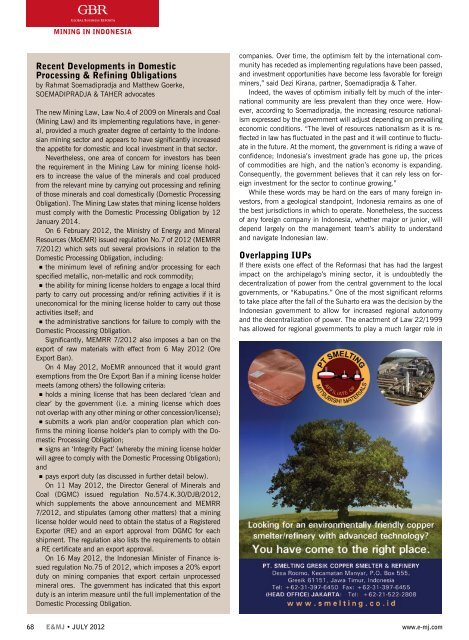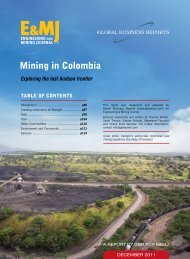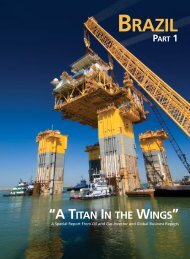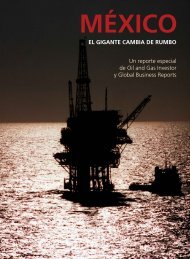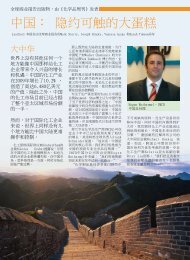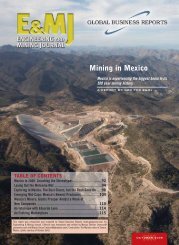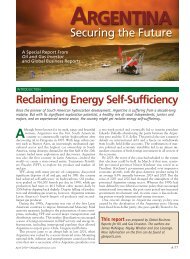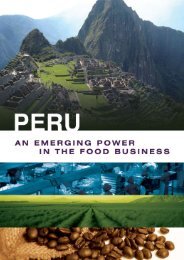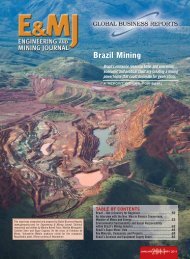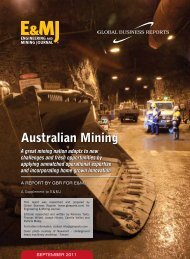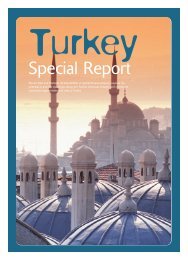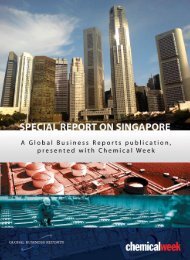Indonesia Mining 2012 - GBR
Indonesia Mining 2012 - GBR
Indonesia Mining 2012 - GBR
Create successful ePaper yourself
Turn your PDF publications into a flip-book with our unique Google optimized e-Paper software.
<strong>Mining</strong> IN <strong>Indonesia</strong><br />
Recent Developments in Domestic<br />
Processing & Refining Obligations<br />
by Rahmat Soemadipradja and Matthew Goerke,<br />
SOEMADIPRADJA & TAHER advocates<br />
The new <strong>Mining</strong> Law, Law No.4 of 2009 on Minerals and Coal<br />
(<strong>Mining</strong> Law) and its implementing regulations have, in general,<br />
provided a much greater degree of certainty to the <strong>Indonesia</strong>n<br />
mining sector and appears to have significantly increased<br />
the appetite for domestic and local investment in that sector.<br />
Nevertheless, one area of concern for investors has been<br />
the requirement in the <strong>Mining</strong> Law for mining license holders<br />
to increase the value of the minerals and coal produced<br />
from the relevant mine by carrying out processing and refining<br />
of those minerals and coal domestically (Domestic Processing<br />
Obligation). The <strong>Mining</strong> Law states that mining license holders<br />
must comply with the Domestic Processing Obligation by 12<br />
January 2014.<br />
On 6 February <strong>2012</strong>, the Ministry of Energy and Mineral<br />
Resources (MoEMR) issued regulation No.7 of <strong>2012</strong> (MEMRR<br />
7/<strong>2012</strong>) which sets out several provisions in relation to the<br />
Domestic Processing Obligation, including:<br />
the minimum level of refining and/or processing for each<br />
specified metallic, non-metallic and rock commodity;<br />
the ability for mining license holders to engage a local third<br />
party to carry out processing and/or refining activities if it is<br />
uneconomical for the mining license holder to carry out those<br />
activities itself; and<br />
the administrative sanctions for failure to comply with the<br />
Domestic Processing Obligation.<br />
Significantly, MEMRR 7/<strong>2012</strong> also imposes a ban on the<br />
export of raw materials with effect from 6 May <strong>2012</strong> (Ore<br />
Export Ban).<br />
On 4 May <strong>2012</strong>, MoEMR announced that it would grant<br />
exemptions from the Ore Export Ban if a mining license holder<br />
meets (among others) the following criteria:<br />
holds a mining license that has been declared ‘clean and<br />
clear’ by the government (i.e. a mining license which does<br />
not overlap with any other mining or other concession/license);<br />
submits a work plan and/or cooperation plan which confirms<br />
the mining license holder’s plan to comply with the Domestic<br />
Processing Obligation;<br />
signs an ‘Integrity Pact’ (whereby the mining license holder<br />
will agree to comply with the Domestic Processing Obligation);<br />
and<br />
pays export duty (as discussed in further detail below).<br />
On 11 May <strong>2012</strong>, the Director General of Minerals and<br />
Coal (DGMC) issued regulation No.574.K.30/DJB/<strong>2012</strong>,<br />
which supplements the above announcement and MEMRR<br />
7/<strong>2012</strong>, and stipulates (among other matters) that a mining<br />
license holder would need to obtain the status of a Registered<br />
Exporter (RE) and an export approval from DGMC for each<br />
shipment. The regulation also lists the requirements to obtain<br />
a RE certificate and an export approval.<br />
On 16 May <strong>2012</strong>, the <strong>Indonesia</strong>n Minister of Finance issued<br />
regulation No.75 of <strong>2012</strong>, which imposes a 20% export<br />
duty on mining companies that export certain unprocessed<br />
mineral ores. The government has indicated that this export<br />
duty is an interim measure until the full implementation of the<br />
Domestic Processing Obligation.<br />
companies. Over time, the optimism felt by the international community<br />
has receded as implementing regulations have been passed,<br />
and investment opportunities have become less favorable for foreign<br />
miners,” said Dezi Kirana, partner, Soemadipradja & Taher.<br />
Indeed, the waves of optimism initially felt by much of the international<br />
community are less prevalent than they once were. However,<br />
according to Soemadipradja, the increasing resource nationalism<br />
expressed by the government will adjust depending on prevailing<br />
economic conditions. “The level of resources nationalism as it is reflected<br />
in law has fluctuated in the past and it will continue to fluctuate<br />
in the future. At the moment, the government is riding a wave of<br />
confidence; <strong>Indonesia</strong>’s investment grade has gone up, the prices<br />
of commodities are high, and the nation’s economy is expanding.<br />
Consequently, the government believes that it can rely less on foreign<br />
investment for the sector to continue growing.”<br />
While these words may be hard on the ears of many foreign investors,<br />
from a geological standpoint, <strong>Indonesia</strong> remains as one of<br />
the best jurisdictions in which to operate. Nonetheless, the success<br />
of any foreign company in <strong>Indonesia</strong>, whether major or junior, will<br />
depend largely on the management team’s ability to understand<br />
and navigate <strong>Indonesia</strong>n law.<br />
Overlapping IUPs<br />
If there exists one effect of the Reformasi that has had the largest<br />
impact on the archipelago’s mining sector, it is undoubtedly the<br />
decentralization of power from the central government to the local<br />
governments, or “Kabupatins.” One of the most significant reforms<br />
to take place after the fall of the Suharto era was the decision by the<br />
<strong>Indonesia</strong>n government to allow for increased regional autonomy<br />
and the decentralization of power. The enactment of Law 22/1999<br />
has allowed for regional governments to play a much larger role in<br />
68 E&MJ • JULY <strong>2012</strong> www.e-mj.com


